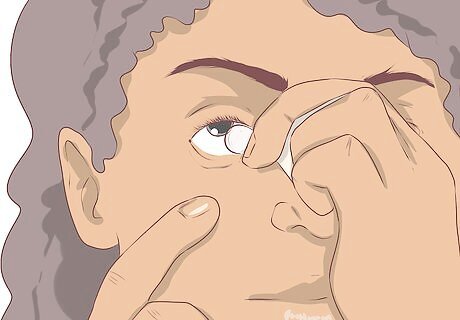
views
X
Trustworthy Source
Mayo Clinic
Educational website from one of the world's leading hospitals
Go to source
Research suggests that you may experience a sensation of pressure during your angiogram, but it shouldn't be painful, as your doctor will likely give you a mild sedative to help you relax.[2]
X
Trustworthy Source
MedlinePlus
Collection of medical information sourced from the US National Library of Medicine
Go to source
By preparing in advance, you can help your test go as smoothly as possible.
Preparing in Advance
Talk to your doctor about your medical history. Ask your doctor if you are supposed to take your usual morning medications. If you have diabetes, ask if you can take insulin or oral blood sugar medications before their test. Tell your doctor if you have a history of asthma, kidney or bleeding problems. Special precautions may be needed if you have one of these conditions. You may be asked not to take aspirin (including other products that contain aspirin) or prescription blood thinners for several days before the test. Discuss with your doctor when you can resume these medications.

Tell your doctor if you are pregnant. Pregnant people need to be cautious about doing certain things to avoid harming the fetus. If you are or might be pregnant, or if you just had a baby, discuss these details with your doctor so that you can decide on the best course of action. It is extremely important to tell your doctor if you are pregnant because an angiogram is needed to detect a potential coronary artery blockage. This may result in the need for reperfusion stenting to restore blood flow to the heart. Use formula for one to two days after your angiogram if you are breast-feeding until the dye has passed through your body.
Complete all necessary pre-procedure tests. Your doctor will determine what testing you need to undergo before your angiogram. Make sure you follow your doctor’s directions and complete any recommended testing. You may need to have blood taken or an electrocardiogram done before the angiogram.
Knowing What to Avoid
Tell the doctor if you are allergic to iodine or shellfish. Iodine dye is usually used in the cardiac catheterization test. Your doctor will need to know if you possess such an allergy so you can explore other treatment options. Other possible dyes can cause a reaction in those allergic to shellfish.
Do not eat or drink anything after midnight the day before your exam is scheduled. Most angiograms are planned for the morning hours, so this shouldn’t be a huge inconvenience. But it is an important part of preparing for your angiogram. If your test is scheduled for later in the day, do not consume any food or drink for 4-8 hours before the test.
Avoid alcohol and tobacco. In the hours preceding your procedure, especially the 24 hours ahead of time, you should avoid alcohol and tobacco products. These can inhibit your behavior, alter test results, and cause other complications during the procedure. If you are given a sedative during the procedure, this could intensify the effects of any alcohol in your system.
Prepping for the Day of the Procedure
Take all your medications with you to the hospital. It is important to tell your doctor about any medications you are taking, including prescription, over-the-counter, herbs, and supplements. Bring them in their original bottles. This will help you remember to tell the doctor about the medications you are on. Remember to also notify the doctor about any medications you might be allergic to.

Prepare your body. Even though the angiogram is a simple procedure, you will need to come to the hospital ready for a surgery. Some ways to prepare yourself include: Following your doctor’s instructions on what to eat/drink in the 24 hours leading up to your procedure, which may include not eating or drinking anything in the six to eight hours leading up to your procedure. Removing your contact lenses, eyeglasses, hair clips, nail polish, and jewelry before the test (leave your jewelry at home, if possible). Emptying your bladder before the test because it can take several hours.
Arrive at the hospital. At the hospital you’ll need to check in and meet with your medical team to discuss exactly what will happen during the procedure so that you feel prepared. They will let you know about any possible complications or risks. You’ll be taken to a room where you can change into a hospital gown before the procedure begins.
Caring for Yourself After the Procedure

Remain in the postoperative care facility. After most angiograms, patients stay at the facility for 4-6 hours after the procedure. This is so that the staff can observe you and make sure there are no postoperative complications. During this time, try to relax. Don’t let yourself stress about the results. Just enjoy taking a break while the doctors are there to watch you.

Arrange for someone to take you home. You may be given a sedative during the angiogram procedure or immediately before it. This sedative will impair your ability to function and to operate a motor vehicle. You’ll need someone to give you a ride home and help you get settled in after your procedure. Try to find someone you trust who can stay with you for a couple hours (preferably overnight) after you get home in case you need help with anything. Most medical facilities will refuse to perform an angiogram on you if you do not have a responsible adult with you who has agreed to take you home.

Get some rest. One of the best ways to help your body recover from any kind of procedure is to get as much rest as possible. This will help your body heal and avoid any potential complications. After the procedure, you’ll probably feel a little discomfort in your groin area. Bed rest will help you avoid moving that area so it can heal properly. You should probably plan on staying home for a few days after the procedure to help you take it easy.

Discuss the outcome with your doctor. Talk to your doctor about any questions or other concerns about the procedure. Tell them how you’re feeling and about any problems you may have encountered. Ask your doctor about the outcome of the test and what the results mean for you moving forward. Are more tests required? Do you need an operation? Should you change some aspect of your lifestyle?



















Comments
0 comment